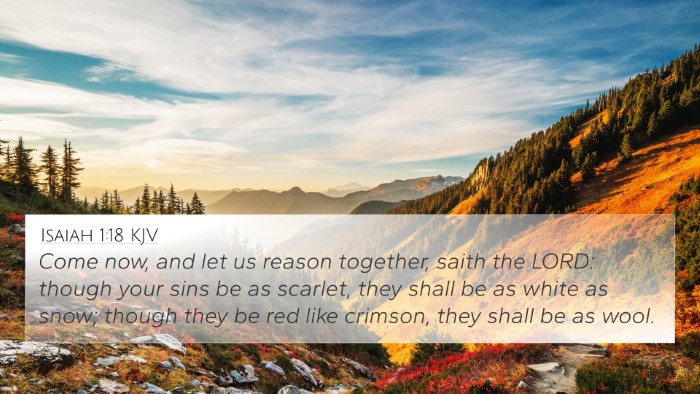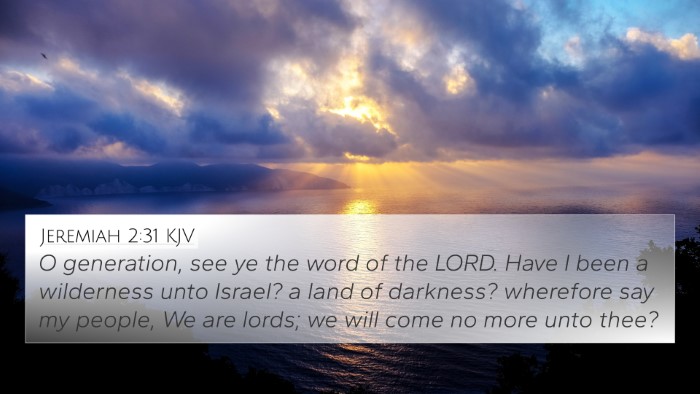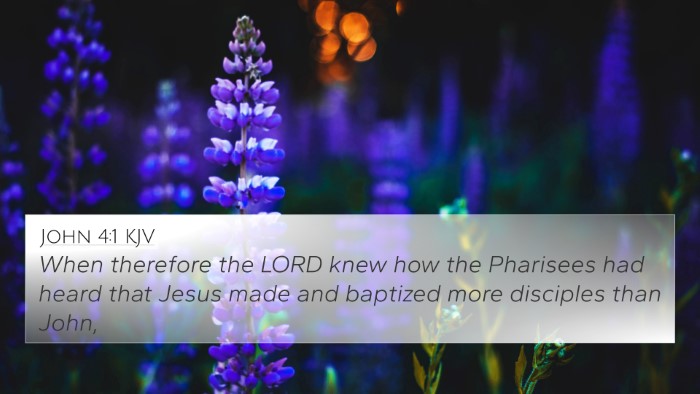Understanding Genesis 4:6
Genesis 4:6 reads: "And the LORD said unto Cain, Why art thou wroth? and why is thy countenance fallen?" This verse captures a pivotal moment in the narrative of Cain and Abel, where God directly engages Cain, who is struggling with feelings of anger and dejection following the rejection of his offering.
This scripture serves as a profound exploration of human emotions, divine interaction, and the consequences of sin. In examining Genesis 4:6 through the lens of public domain commentaries, we can gain multiple insights into its meanings and implications.
Insights from Commentaries
- Matthew Henry: Henry emphasizes the significance of God’s question to Cain, suggesting that it reflects God's desire for reconciliation and His willingness to counsel Cain in his time of turmoil. It demonstrates how God seeks to understand and address human emotions, urging Cain to reflect on his feelings of anger instead of succumbing to them. This divine inquiry serves as a reminder that God is ever-present, seeking dialogue even in moments of inner conflict.
- Albert Barnes: Barnes notes that Cain’s rage is not merely fruitless but destructive, serving as a reminder of the dangers posed by unchecked emotions. He explains that God’s questioning serves two purposes: to probe Cain’s heart and to redirect him away from sin. This engagement challenges Cain to confront the root of his anger and consider how to respond righteously, thus providing a profound lesson on personal accountability and spiritual introspection.
- Adam Clarke: Clarke highlights the theological implications of God’s address to Cain. He interprets God's question as an invitation for Cain to reflect on his actions and their consequences. Clarke suggests that God is not merely reproving Cain but also providing him with an opportunity for repentance. This understanding aligns with the broader biblical theme of grace where God offers a second chance and the chance for redemption, even for those who have sinned.
Thematic Connections and Cross-References
In understanding Genesis 4:6, it is beneficial to consider connections with other scripture passages. Below are seven biblical cross-references that relate to the themes in this verse:
- James 1:20: "For the wrath of man worketh not the righteousness of God." This verse echoes the message that anger must be controlled to align with God's righteousness.
- Proverbs 16:32: "He that is slow to anger is better than the mighty; and he that ruleth his spirit than he that taketh a city." This serves as a reminder of the importance of mastering one's emotions.
- 1 John 3:12: "Not as Cain, who was of that wicked one, and slew his brother." This reframes Cain’s actions within a larger narrative of sin and righteousness, highlighting the consequences of envy and rage.
- Genesis 4:7: “If thou doest well, shalt thou not be accepted? and if thou doest not well, sin lieth at the door.” This verse follows Genesis 4:6 and reinforces God's counsel to Cain, encouraging him to do good to overcome his feelings.
- Matthew 5:22: "But I say unto you, That whosoever is angry with his brother without a cause shall be in danger of the judgment." This connects Cain's anger to the teachings of Jesus on the dangers of anger and unmet expectations.
- Hebrews 11:4: "By faith Abel offered unto God a more excellent sacrifice than Cain." This reflects on the nature of Cain’s offering compared to Abel’s, shedding light on the root of Cain’s anger.
- Romans 12:1: "I beseech you therefore, brethren, by the mercies of God, that ye present your bodies a living sacrifice, holy, acceptable unto God." This verse invites the faithful to reflect on their offerings and attitudes before God.
Implications of the Verse
Genesis 4:6 serves not only as a narrative device but as a theological touchstone, exploring themes of sin, anger, and divine communication. The verse shows how God desires a relationship with humanity, offering guidance and inviting self-reflection. It challenges readers to consider their own emotional responses and to seek constructive channels for their feelings of anger and disappointment.
Using Biblical Cross-References for Deeper Understanding
For those interested in exploring the deeper meanings behind Bible verses like Genesis 4:6, tools for cross-referencing can be invaluable. Utilizing a bible concordance or a bible cross-reference guide can enhance your study experience. Here are some suggestions on how to utilize these resources effectively:
- Use a bible concordance to find terms related to your verse of interest, leading to deeper explorations of concepts such as anger, sin, and divine conversation.
- Engage in a cross-reference Bible study method by connecting verses like Genesis 4:6 with similar themes across scriptures involving personal conflict and divine guidance.
- Explore cross-referenced themes across the Old and New Testaments to identify overarching messages within the bible, allowing for a richer grasp of biblical theology.
- Look for resources that offer bible chain references, which guide you through interconnected verses and themes, enhancing your understanding of scripture.
- Consider participating in a bible study group, where collective discussions on cross-referencing can lead to profound insights and a deeper grasp of interconnected biblical teachings.
Conclusion
In conclusion, Genesis 4:6 stands as a crucial teaching on the nature of human emotions, the significance of divine inquiry, and the importance of righteous living. By engaging with this verse through public domain commentaries and cross-referencing related scriptures, readers can cultivate a nuanced understanding of its implications and applications in their lives.
As we explore the layers of meaning within biblical texts, it becomes clear that connections amongst scriptures are essential for holistic understanding and faithful living. Utilizing the tools of cross-referencing not only enriches individual study but also fosters a community grounded in scripture.












